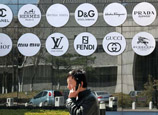
Though there are no official consumption numbers yet, data within the 2012 China Luxury Market Study conducted by consulting firm Bain & Company show the overall year-on-year growth of the luxury market in China fell to 7 percent in 2012, compared with 30 percent in 2011.
Recent economic indicators have pointed to further gloom ahead, with the National Bureau of Statistics indicating the economy grew by just 7.7 percent in the first quarter of the year, compared with 7.9 percent in the previous quarter.
Global luxury giants, such as Kering (previously known as Pinault-Printemps-Redoute, or PPR) which owns Gucci, Saint Laurent, Puma and others, and LVMH from France, and Richemont from Switzerland, earlier this year indicated that they will stop expansion in China.
David Lee, the China director for luxury consumption research at Ipsos, the Paris-based market research firm, said the overall robust luxury market in China will neither be affected by the government crackdown on lavish spending nor the slowing of the economy.
Lee said the fact that Chinese are the largest consumers of luxury goods, accounting for more than a quarter of global purchases, is not going to change, because China's economy, even with its slight slowdown, still has the best credentials.
"The crackdown is targeted at high-end gifts for civil servants and not at high-end luxury consumption," he said.
"The overall desire for luxury goods is still strong and will continue to grow in China", with buyers becoming more sophisticated and understanding about luxury.
According to the Bain report in December, about 30 percent of the luxury goods bought by Chinese people are for gifts, with the rest being for self-consumption, which constitutes "rigid demand", Lee said.
However, unlike those who simply buy big luxury brand items as gifts, there is a growing taste for exclusivity among increasingly sophisticated Chinese customers, especially those in first-tier cities such as Beijing and Shanghai.
Lee said the changing landscape means that high-end goods producers need to do more to attract Chinese consumers, as many of them are no longer interested in conspicuous consumption, but keener on better options and better shopping experiences.


















 Jump for joy after flight of fantasy
Jump for joy after flight of fantasy


![]()
